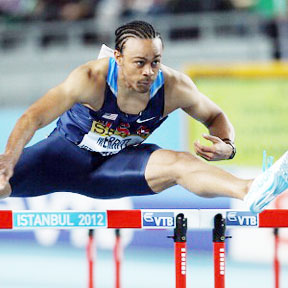(Reuters) – His “Predator” style hair flowing, Aries Merritt skimmed the hurdles with new enthusiasm.
His work ethic, diet and most importantly his approach to the first hurdle all had changed.
Like a number of high hurdlers, Merritt abandoned the more traditional eight-step approach to the first hurdle and joined the seven-step club in a bid for consistency and speed.
Payoff came quickly.
On a cold March day in Istanbul, Merritt surprisingly won the world indoor 60 metres hurdles title, defeating former outdoor world record holder and 2004 Olympic champion Liu Xiang of China.
“The success so immediately is kind of shocking,” the 26-year-old told Reuters in a phone interview from Bryan, Texas.
“I didn’t know I would become adept so quickly. My competitors (when they switched) were running awful. Then they got used to it and they started to run really well.”

Both momentum and aggression are gained from the new approach, said Merritt, the 2004 world junior champion and last year’s fifth-ranked hurdler.
“When you do eight steps, some hurdlers have to kind of slam on the brakes in order to take the hurdle,” said the U.S. indoor champion. “With seven steps you can really drive through a hurdle and take it with a little more aggression.”
Named for the Greek god of war Ares (although his name is spelled Aries, like the astrological symbol for the Zodiac), he tried gymnastics as a child before switching to hurdling.
“He is unbelievably coordinated,” said coach Andreas Behm.
His long legs help, too, offsetting his 6-foot-1 height, shorter than many top hurdlers.
TOUGH TIMES
A teenage and college standout, “I was supposed to be this phenom when I first turned professional in ‘06,” Merritt said. “Then life happened.”
He missed the 2008 Olympic team by one place after a roller coaster year in which he pulled his right hamstring and grieved the death of his grandmother.
Five minutes before racing at the 2009 world championships, he twisted an ankle and never made it past the first round.
A painful stress fracture curtailed his 2010 season, and in 2011 he hit a hurdle and tied for fifth at worlds.
“I think those disappointments have fueled him,” said Behm. “It’s as if maturity and talent have come together.”
The seven-step approach may complete the process.
“My first five (hurdles) is my weakness,” Merritt said, “and now that I have that ironed out, I can focus on my strength, which is the last five hurdles.”
In the cutthroat world of hurdling, every edge is crucial.
Of the top 10 ranked high hurdlers in the world, six were Americans, including world champion Jason Richardson, 2008 Olympic bronze medallist David Oliver and Merritt.
All six, barring injury, will be competing in June’s U.S. Olympic trials for one of the three coveted spots to London.
“Our U.S. Olympic trials are harder than the Olympics,” said Merritt. “But I feel like I have a really good chance.”
His indoor triumph over Liu reinforced the idea.
“My first time ever beating him,” Merritt said with a chuckle after erasing a 14-meet losing streak to Liu.
PREDATOR LOOK
But to be among the best, Merritt knows he must improve his personal best of 13.09 seconds, set in 2007.
His foot speed is good, but overall he remains far behind Cuban world record holder Dayron Robles (12.87 seconds), Liu (12.88) and Oliver (12.89).
“We have not run outdoors, but every indication points to the fact he should (break 13 seconds) this year,” said Behm. “He is probably as lean and fit as he has ever been.”
The faster he goes, the more his long hair seems to flow.
“I always have to pull it back,” Merritt said. “I don’t want to say it is a distraction, but I don’t want it to get in the way.”
He tries to style his hair slightly different for each race. For the world indoor meeting, three hours of work created what some call the predator look, after the extraterrestrial species from the 1987 film “Predator” starring Arnold Schwarzenegger.
“I don’t have a name for it,” he said. “It’s just cornrows and the rest is braided individually in the back. It takes a little time to make it look nice, but it’s all for show.”
A show Merritt hopes will bring fast times and a spot on his first U.S. Olympic team.




